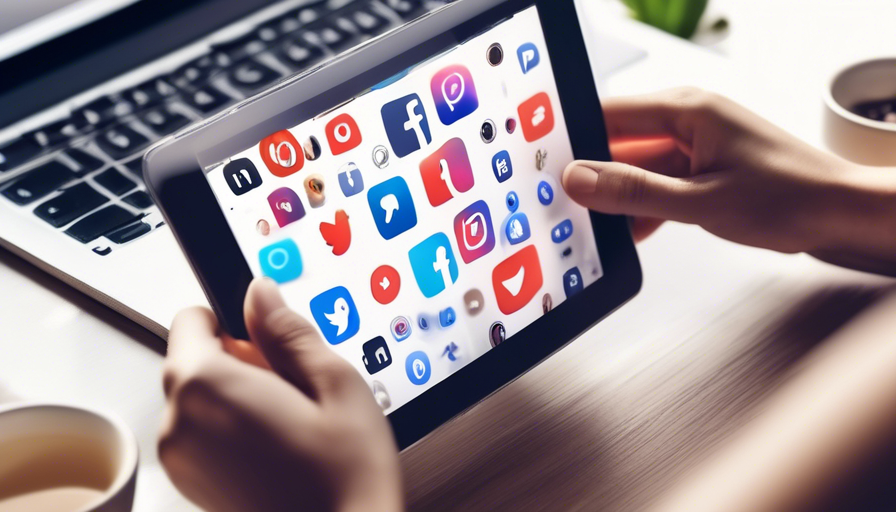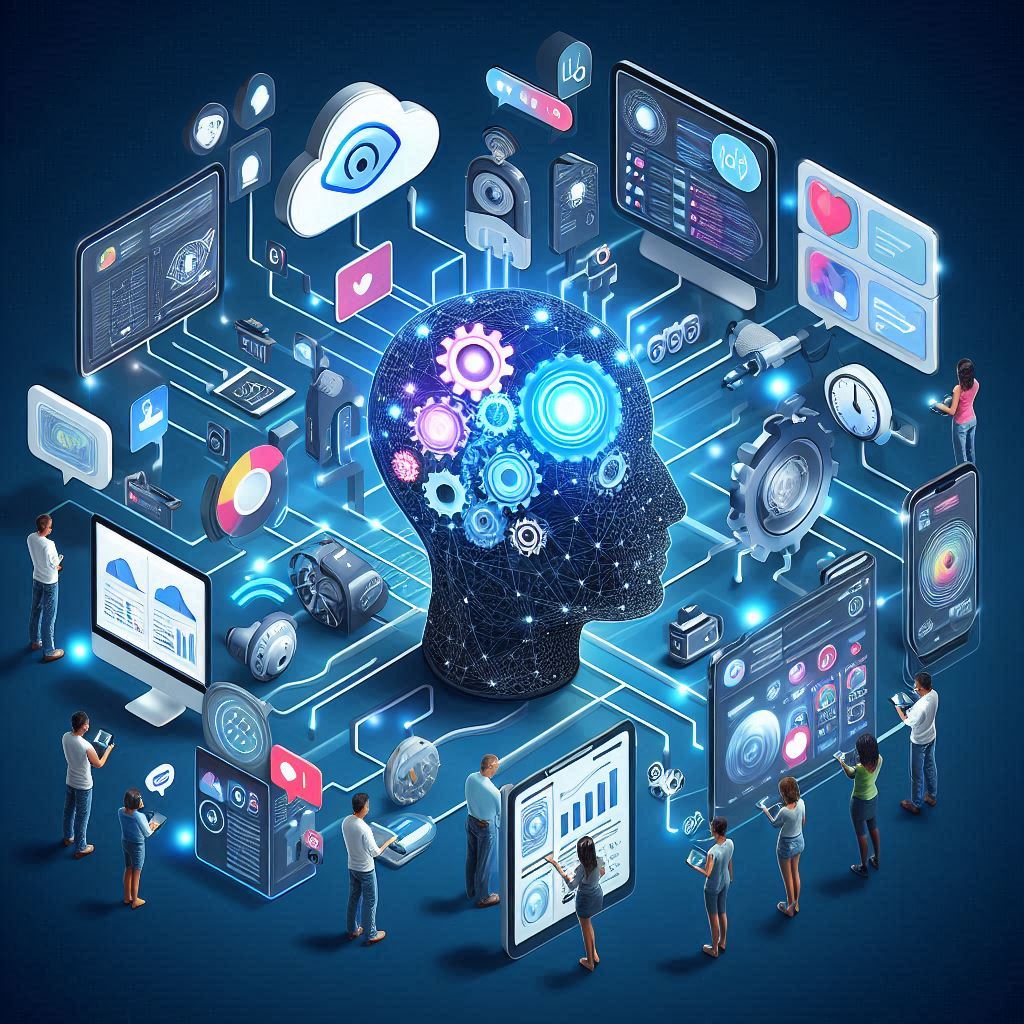
In the ever-evolving world of social media marketing, content creation is at the heart of any successful strategy. Social media platforms like Instagram, Twitter, Facebook, LinkedIn and TikTok are fiercely competitive environments where businesses and influencers alike are constantly striving to capture the attention of their audience. Amid this digital noise, AI (artificial intelligence) is emerging as a powerful tool to help marketers not only streamline content creation but also generate fresh, engaging ideas and develop more effective social media strategies.
This article explores how to harness the power of AI for generating social media content ideas and building a robust strategy. From understanding your audience to using AI-powered tools for content creation, we'll discuss various approaches and tools to help you enhance your social media presence and stay ahead of the curve.
1. Understanding AI’s Role in Social Media Marketing
Artificial intelligence, at its core, refers to machines or algorithms designed to mimic human intelligence to perform tasks such as learning, reasoning, problem-solving, and decision-making. In the context of social media, AI can analyze large amounts of data and extract valuable insights that would be too complex or time-consuming for humans to process manually.
AI’s role in social media marketing is multifaceted. It can help with:
- Content Creation: AI tools can generate text, images, and videos, as well as suggest creative ideas based on trends and audience behavior.
- Content Curation: AI can analyze vast amounts of content online to find relevant material that can be shared or used for inspiration.
- Audience Insights: By analyzing social media activity, AI can help marketers understand their audience’s preferences, behaviors, and interactions, allowing them to create more targeted content.
- Trendspotting: AI can help identify emerging trends by tracking what’s popular and relevant in real-time.
- Performance Analysis: AI can provide predictive analytics to help refine strategies based on past performance and emerging trends.
1.1 Key Benefits of AI in Social Media Content Creation
- Speed and Efficiency: AI-powered tools can quickly generate content ideas, analyze user data, and automate repetitive tasks, saving marketers time.
- Personalization: AI can analyze audience behavior to deliver content that resonates with specific segments, ensuring higher engagement.
- Data-Driven Decisions: AI tools can provide insights based on real-time data, allowing for more informed, agile decision-making.
2. Using AI for Generating Content Ideas
One of the most challenging aspects of social media marketing is consistently coming up with fresh, engaging content ideas. AI offers several tools and approaches that can make this process easier, faster, and more effective.
2.1 Leverage AI Tools for Content Ideation
AI-powered tools can help marketers generate content ideas based on audience interests, trending topics, and content gaps. Here are a few examples of how AI can be used for content ideation:
- BuzzSumo: BuzzSumo is a content research tool that uses AI to analyze millions of pieces of content across the web. By entering a keyword or topic, you can discover trending content and see what types of posts are performing well in your niche. It can also identify top influencers and competitors, providing ideas for content that resonates with your target audience.
- AnswerThePublic: This tool uses search data to provide a visualization of common questions and queries related to your topic. It’s an excellent resource for generating content ideas that directly address what your audience is asking about.
- Google Trends: While not strictly AI-driven, Google Trends uses machine learning to analyze search behavior over time and predict trends. By using Google Trends, you can identify rising topics and ensure that your content is timely and relevant.
- AI Writing Assistants (e.g., Romo AI): These AI writing tools can help generate ideas and even create drafts for your social media posts, blog articles, captions, and ad copy. By inputting a brief prompt, AI writing assistants can generate numerous content variations, giving you a broader pool of ideas to work from.
2.2 AI-Powered Content Curation
In addition to generating new content, AI can help with content curation. This involves finding and sharing content created by others that’s relevant to your audience. AI tools can help you:
- Monitor Social Media: Tools like SocialBee and Hootsuite use AI to scan social media platforms for trending topics and content that aligns with your brand’s message. They help you identify what’s hot in your niche, providing inspiration for your own posts.
- Content Aggregators: Tools like Curata and Scoop.it leverage AI to find high-quality articles, blog posts, and social media content from around the web, curating it based on your audience’s interests. These can help fill in the gaps in your social media calendar while ensuring the content is relevant.
3. Personalizing Content with AI
Personalization is key to building meaningful relationships with your audience. AI tools can help you tailor your content to different audience segments, ensuring that each group receives messaging that speaks to their unique preferences and behaviors.
3.1 Segmentation and Targeting
AI can analyze user data from your social media accounts (e.g., demographics, interests, behaviors) and segment your audience based on these insights. By understanding these segments, you can:
- Create personalized content for each group (e.g., different social media posts for different age groups or interests).
- Optimize posting times for maximum engagement.
- Test different content formats (images, videos, polls) to see what resonates best with each segment.
Tools like Facebook’s AI-powered Ads Manager and Instagram Insights can help with segmentation and targeting by offering detailed demographic breakdowns and behavior analytics.
3.2 Dynamic Content Creation
Some AI platforms allow you to create dynamic content, which changes based on the audience’s preferences. For example, you might use a tool like Phrasee, which generates subject lines and headlines for email marketing, to create multiple variations of a social media post that dynamically adjusts to user engagement patterns.
4. AI for Trendspotting and Content Strategy
Keeping track of industry trends and emerging topics is crucial for staying relevant on social media. AI can help you identify trends early, so you can align your content strategy with current discussions in real-time.
4.1 Identifying Trends with AI
AI tools like Trendalyze, Trends.co, and Sprout Social can analyze vast amounts of social data to spot emerging trends in real time. These tools can track specific hashtags, topics, and user behavior patterns to determine what’s gaining momentum within your industry or niche.
AI can also identify seasonal trends, events, or keywords that are likely to become more prominent. For example, if a viral hashtag is gaining traction, AI tools can alert you so you can quickly create content around that trend.
4.2 Predictive Analytics
One of the most exciting uses of AI in social media is predictive analytics. Tools like Hootsuite’s Impact, HubSpot’s AI-driven Marketing Hub, and Buffer Analyze use AI to provide data on the types of content that are most likely to perform well in the future based on historical data. By analyzing past performance and engagement trends, these tools can help predict the success of various content types (e.g., video, infographics, user-generated content).
This predictive capability allows marketers to:
- Adjust content strategies in real-time.
- Identify high-performing content types to double down on.
- Plan content calendars that align with predicted trends.
5. Optimizing Content with AI
AI can also help you optimize your content for maximum engagement and reach. From crafting compelling headlines to choosing the best hashtags, AI tools can provide real-time suggestions to improve your content’s effectiveness.
5.1 AI for Copywriting and Headlines
AI-powered tools like Copy.ai, Jasper, and Writesonic can help optimize your social media copy, generating multiple variations of text to test different tones and messaging. These tools often integrate natural language processing (NLP) to ensure your posts are engaging, on-brand, and relevant to your audience.
- Headline Optimization: AI tools can analyze what types of headlines (e.g., questions, statistics, emotional triggers) generate the highest levels of engagement.
- Sentiment Analysis: Some AI tools provide sentiment analysis that helps you gauge the emotional tone of your content. For example, you may discover that content with a positive tone resonates more with your audience than a neutral or negative one.
5.2 Hashtag Generation
Hashtags are a vital part of social media marketing, but manually finding the best hashtags for your content can be a challenge. AI tools like Hashtagify and RiteTag help you find relevant hashtags based on your content, audience, and niche. These tools use AI to analyze hashtag performance, suggesting tags that are likely to increase your reach and engagement.
6. Measuring and Adjusting Your Strategy with AI
AI is not just useful for content creation and ideation—it’s also a powerful tool for measuring the success of your social media efforts and making data-driven adjustments to your strategy.
6.1 AI Analytics Tools
AI-powered analytics tools like Sprout Social, Google Analytics, and Socialbakers provide in-depth insights into your social media performance. These tools track key metrics such as engagement, reach, impressions, and conversions, helping you understand what’s working and what isn’t.
By analyzing these insights, AI can suggest adjustments to your content, posting schedule, and overall strategy to improve your results.
6.2 Automating Social Media Campaigns
AI can also automate parts of your social media campaigns, from scheduling posts to managing interactions. Tools like Buffer and Hootsuite allow you to automate your social media posts, ensuring they go live at optimal times based on audience behavior. Additionally, AI-powered chatbots like ManyChat and MobileMonkey can manage interactions with your audience, handling frequently asked questions, promoting content, and even offering personalized responses based on past user interactions.
6.3 A/B Testing and Optimization
One of the most important elements of social media marketing is constantly refining your content strategy. AI can assist in A/B testing by providing insights into what’s working best. With AI tools, you can test different variations of content (e.g., post formats, headlines, images, captions, etc.) and measure which version resonates most with your audience.
AI algorithms can analyze the results from A/B tests and automatically suggest adjustments to improve performance, reducing the need for manual interpretation of data. For example, if an AI tool detects that posts with video content have higher engagement than those with static images, it can advise you to incorporate more video content into your future posts.
7. AI for Visual Content Creation
In addition to text-based content, AI can also help create visual content for social media. Visuals are essential for driving engagement on platforms like Instagram, Pinterest, and TikTok, and AI can play a crucial role in generating high-quality images, videos, and graphics.
7.1 AI-Powered Image Creation Tools
Tools like Canva and Crello now offer AI-powered features that allow you to create stunning graphics and visuals for your social media posts. With templates that are designed based on successful design principles, AI tools help you customize and create visuals quickly without the need for advanced design skills.
In addition, AI-based tools like DeepArt and Runway ML use machine learning to transform your photos and videos into works of art, offering an easy way to generate visually captivating content.
7.2 Video Content Creation with AI
Video is one of the most engaging content types on social media, and AI has made video creation much more accessible. Platforms like Lumen5 and Pictory leverage AI to convert articles, blogs, and scripts into professional-looking videos. With minimal input, these tools can automatically generate video content that includes relevant imagery, animations, and text, perfect for social sharing.
Moreover, AI tools can help with video editing by automatically trimming clips, adding transitions, and selecting the most engaging moments. Tools like Magisto and Adobe Premiere Pro's AI-powered features are excellent for creating polished, shareable video content quickly.
7.3 Enhancing Visual Content with AI Insights
AI can also be used to analyze the performance of your visual content. Image recognition tools like Google Vision AI or Clarifai can analyze the visual elements of your posts and provide insights into what types of images are most likely to resonate with your audience. These tools can help determine the best color schemes, compositions, and visual styles to improve your engagement.
8. The Future of AI in Social Media Content Strategy
As AI technology continues to evolve, its role in social media marketing will only grow. Here are a few trends to watch for in the future of AI-driven social media content strategies:
8.1 Advanced Personalization
AI will continue to refine its ability to personalize content at a granular level. Future AI tools may be able to tailor content to an individual’s browsing behavior, location, and even real-time emotions. This hyper-personalization will take social media marketing to the next level, offering a completely customized experience for each user.
8.2 Voice and Conversational AI
With the rise of voice-activated assistants like Alexa, Siri, and Google Assistant, voice search and conversational AI are expected to play a bigger role in social media marketing. AI will help marketers create content that is optimized for voice search, enabling more interactive and personalized conversations with customers through social media platforms.
8.3 Content Generation and Automation at Scale
As AI becomes more sophisticated, the ability to generate entire content campaigns at scale will become more common. AI-powered tools will not only create individual pieces of content but will also generate entire social media strategies based on data-driven insights, automating everything from content creation to publishing and performance analysis.
8.4 AI-Driven Social Listening
Social listening tools powered by AI will continue to evolve, allowing businesses to monitor conversations in real-time and engage with customers more effectively. AI will make it easier to detect brand sentiment, track customer concerns, and identify opportunities for real-time engagement or crisis management.
Conclusion
AI is rapidly transforming social media marketing by streamlining the process of content creation, ideation, personalization, and strategy development. With AI, marketers can generate fresh content ideas, optimize social media strategies, and create hyper-targeted content that resonates with their audience.
AI tools allow businesses to save time on repetitive tasks, such as content curation, hashtag generation, and performance analysis, so they can focus on more strategic activities. Whether you’re a small business owner looking to create content on a budget or a large brand trying to scale your social media efforts, AI offers valuable support at every step.
The future of social media marketing is undoubtedly intertwined with AI, and those who adopt and embrace these tools will have a significant edge over their competitors. From automating content production to predicting trends and measuring performance, AI can provide insights and capabilities that will help marketers create more effective, engaging, and personalized social media experiences.
By integrating AI into your social media strategy, you can stay ahead of the curve and craft content that truly connects with your audience, drives engagement, and builds long-term brand loyalty.

